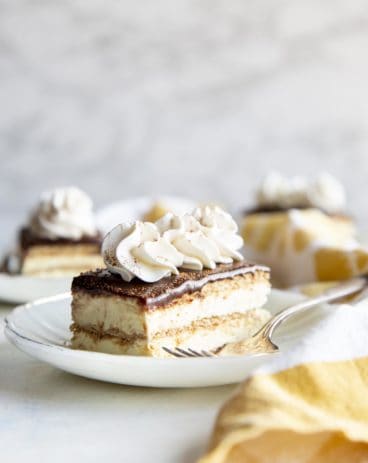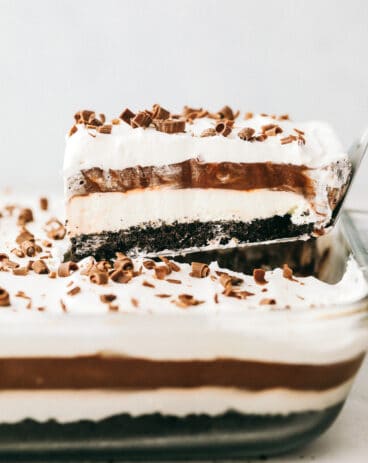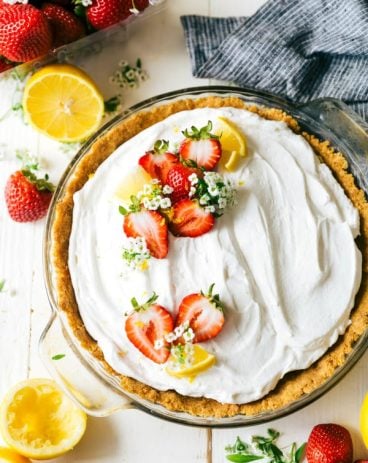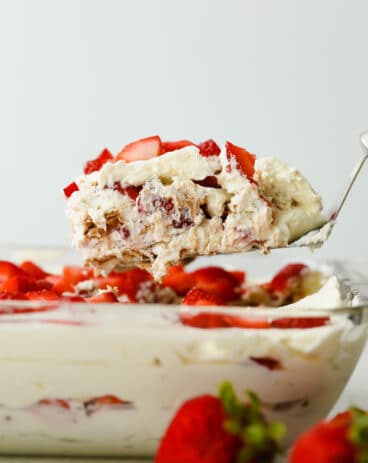
Crispy and creamy, this ricotta-filled dessert is as decadent as it gets! Cannolis are the traditional Italian treats you’ll want to make again and again.
There’s a reason cannolis have been loved for hundreds of years! You’ll have to try these other classic recipes. Baklava, crème brulée, and apple galette are more old-world desserts that will wow with their sweet, delicious flavor!
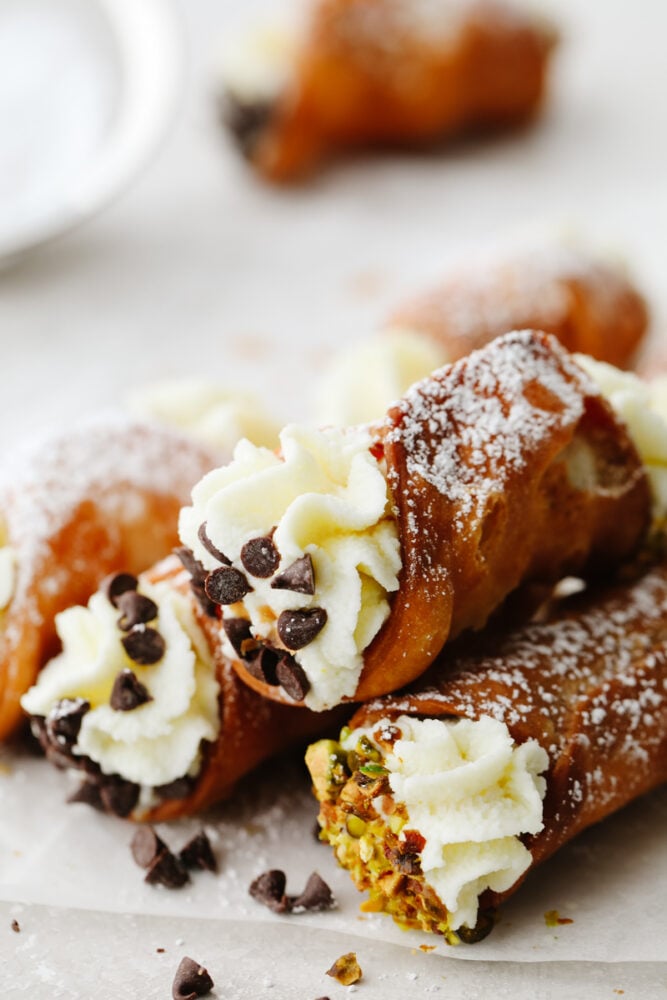
Flaky and Delicious Cannoli Recipe
Cannolis are one of those things where if I see them behind the glass of a bakery, I just can’t resist getting one. That first bite through layers of a golden, flaky shell and sweetened ricotta cream is pure heaven. The textures of cannoli are, honestly, out of this world! These tasty desserts have Sicilian roots and some even date them back to 827 AD! You know it’s got to be good if it was passed down for a thousand years.
Sometimes you’ll find them dipped in nuts or filled with chocolate chips which really enhances their flavor. (I’ve got both varieties in this recipe!) To be honest, it’s no surprise that cannolis are found in ice creams and sweet spreads. You can even use empty shells as “chips” to go with it! The creaminess of the ricotta and the buttery shell is an amazing flavor combination you won’t want to miss.
Ingredients for Cannoli
Cannolis use a lot of standard baking ingredients. So as long as you’ve got some ricotta and a little red wine, you can whip up these incredible desserts! As always, measurements for each ingredient is located in the recipe card at the end of the post.
Shells
- All-Purpose Flour: Gives your cannolis a light, flaky structure.
- Granulated Sugar: This is what’s going to give your shells their amazing sweetness! When you fry them, the sugar melts down to give the cannolis their gorgeous golden brown color.
- Salt: Added to enhance flavors.
- Unsalted Butter: Since we add salt separately, I like using unsalted butter in this recipe. Butter is going to give your cannoli shells a tasty, rich flavor!
- Marsala or Red Wine: If you’re wanting to make the most traditional version of this recipe, use marsala wine! It’s also Sicilian and is what has been used in cannolis, historically. This can be substituted for both red wine and grape juice, but will slightly alter the overall flavor.
- Egg: Used as a binding agent and to provide structure.
- Egg white: An egg white is needed for an egg wash.
- Vegetable Oil: This is what I use for frying! Canola oil will work, too.
Filling
- Whole Milk Ricotta: This is the base of your filling. With a little powdered sugar, it becomes a sweet, creamy delight! Make sure you strain your ricotta. This way, your filling won’t be runny.
- Powdered Sugar: Added for sweetness! Because of its texture, it helps make your filling smooth, too.
- Mini Chocolate Chips and Chopped Pistachios: These are optional. For extra flavor, add some in!
How to Make Cannolis
If you want to make cannolis, you’re going to need a little patience. This recipe has a longer prep time than most desserts, but it is well worth it! Honestly, I think the whole process is fun. You can even get the kids involved to help shape and fill the cannolis!
For Shells
- Use Food Processor for Dough: To begin, add the flour, sugar and salt to a food processor and pulse for about 10-15 seconds until thoroughly combined. Add in the butter and combine until you have a fine, crumbly dough.
- Mix in Egg and Wine: Add in the wine and egg and pulse until the dough comes together. Turn out onto a clean surface and knead together until smooth, about 5-6 minutes, although it could be a little longer. Wrap the dough tightly in plastic wrap and rest in the fridge for at least an hour.
- Heat Oil: When the hour is just about up, get a large heavy bottomed pot and add the oil. Heat the oil over medium heat until it reaches 360°.
- Roll Out Dough: Cut the dough ball into 4 pieces and roll out one at a time, leaving the remaining pieces covered in the fridge until ready to roll out. Roll the dough on a well-floured surface as thin as you can. ¼ inch is going to be too thick, so try rolling it even thinner. The thinner the dough, the better it will crisp up when you fry it. Cut into 4 inch circles using a cookie cutter.
- Shape Cannolis: Lightly spray the cannoli forms with cooking oil, or brush them with vegetable oil. Wrap the dough circles around the cannoli forms and brush the edge with the egg wash and press the opposite side of the dough to it. Take the time to really press the edge together to make sure they come together as one. If you don’t seal it well enough it could come apart in the oil.
Frying
- Immerse Shells: Use tongs or a spider to immerse shells in the hot oil (about 3-4 at a time, depending on the size of your pot. Don’t overcrowd them!) and fry until golden brown all around, about 1-2 minutes. Turn the shells as needed and try to keep the oil temp between 360° and 380° while frying.
- Dry: Carefully remove the shells from the oil using tongs and transfer to a plate lined with paper towels to drain. Let cool slightly before using the tongs to pull the form free from the shell. Let cool completely.
- Repeat: Repeat with remaining dough until all the dough has been used. When using scrap dough, press together and let rest for at least 10 minutes before rolling it out again.
For Ricotta Filling
- Strain Ricotta: Be sure to strain the liquid from the ricotta using cheesecloth otherwise the dip can be runny. Place several layers of cheesecloth in a strainer and add the ricotta. Let drain for at least 20 minutes before squeezing by hand to remove the excess liquid. This can take a bit of time, but it’s worth it to get a better consistency!
- Mix Sugar and Ricotta: Add the strained ricotta and powdered sugar to a mixing bowl. Beat with a paddle until just combined.
- Pipe Cannoli Shells, Add Toppings: Pipe filling into fully cooled cannoli shells and dip the ends in mini chocolate chips or chopped pistachio seeds, if desired. Dust with powdered sugar and serve immediately.
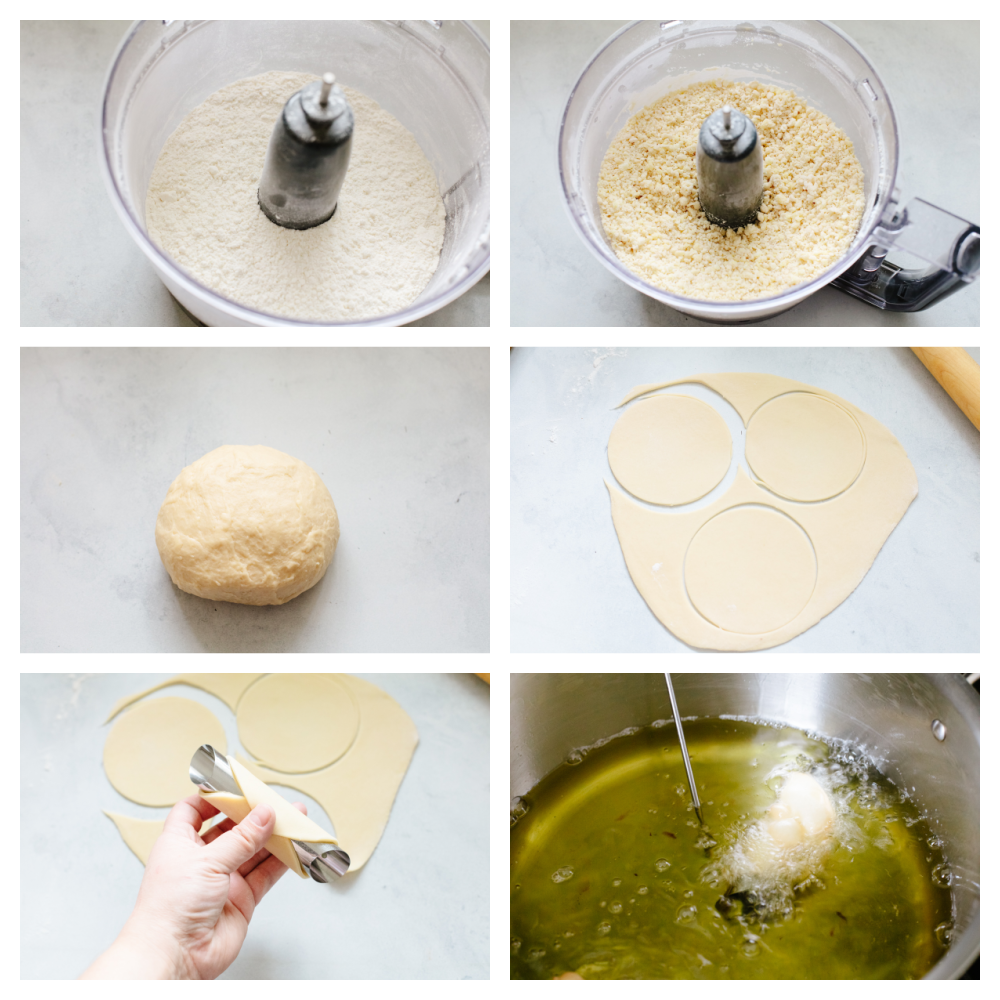
Tips For Successful Cannolis
Homemade cannolis aren’t the easiest dessert out there, but they certainly hit the spot! A light, creamy, not too sweet filling surrounded by a delightfully crisp shell…it’s hard to beat a cannoli! They can be a little testy, so here are some tips that will help you make great cannolis!
- Rest Your Dough: Letting the dough rest between rolling it out will give the gluten in the dough time to relax so your cannoli shells aren’t tough.
- Roll Dough Thin: The thinner the better for cannoli shells! If you don’t roll the dough thin enough, you run the risk of having the shells not fully cook through.
- Cannoli Shells Coming Apart: If the shells are not staying around the form while in the oil, make sure your dough is A) rolled very thin, B) sealed with the egg white egg wash right on the edge, and C) The edges are pressed together very, very well!
- Straining Ricotta: Don’t skip this step! Ricotta cheese has a high water content and that can result in a very runny filling. It takes a bit more time to make sure the cheese has the excess liquid removed, but it’s very worth it to make sure it’s done and gain a thicker, smoother consistency for your cannoli filling.
- Fill Before Serving: The filling in cannolis can make the shell soft if you fill it too early. It is best to fill the cannolis just before serving them.
Storing Cannolis
Cannolis don’t keep very well once they’ve been filled, but the filling and shells can be prepared separately before being ready to serve! Fill one hour before serving for best results.
- At Room Temperature: Store cannoli shells at room temperature in an airtight conainer. They will stay fresh for up to one week.
- In the Refrigerator: Since the filling is cheese based, it needs to stay in the fridge until the cannolis are ready to be eaten. Store your filling in an airtight container- it will keep for 5 days.
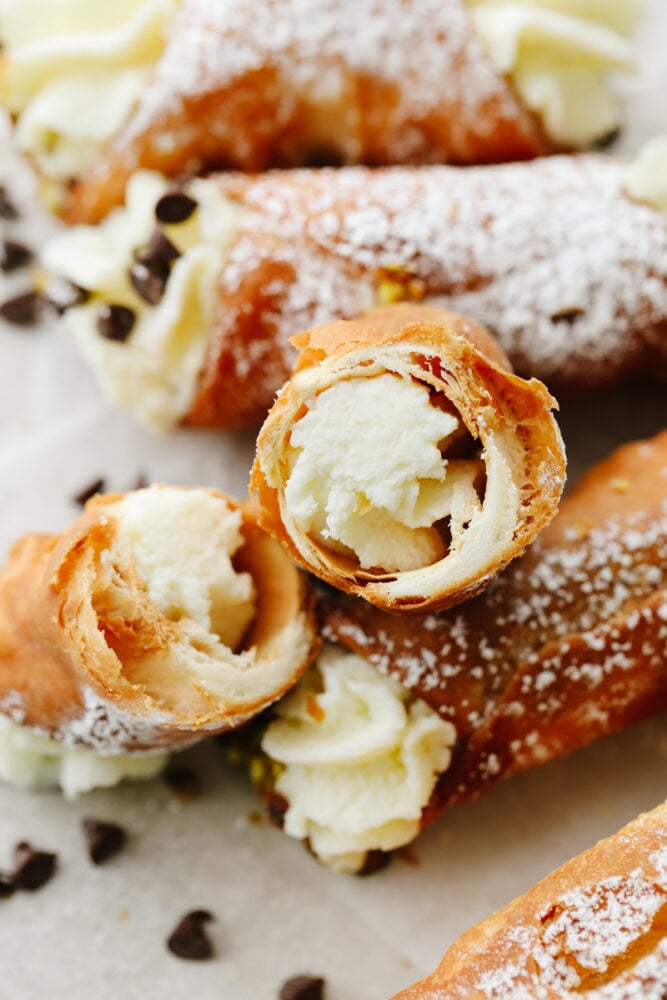
More Creamy Desserts
I love desserts with a creamy filling. They taste so good and just melt in your mouth! These are some of my favorite cream-filled dessert recipes. Whether you want chocolatey or fruity, there’s something for everyone! You’ll love how dreamy each of these treats are! And the best part? They’re super easy to make, too!
Desserts
No-Bake Chocolate Eclair Dessert
Desserts
Chocolate Lasagna
Desserts
Easy Lemon Pudding Pie
Desserts
Strawberry Icebox Cake

Cannolis
Ingredients
Shells
- 2 Cups All Purpose Flour
- 2 Tablespoons Granulated Sugar
- ¼ Teaspoon Salt
- 3 Tablespoons Unsalted Butter
- 1/3 Cup Marsala or Red Wine
- 1 large Egg
- 1 Egg white for egg wash
- 2 Quarts Vegetable Oil for frying
Filling
- 32 Oz Whole Milk Ricotta Strained
- 1 Cup Powdered Sugar
- Mini Chocolate Chips optional
- Chopped Pistachios Optional
Instructions
Shells
- Add the flour, sugar, and salt to a food processor and pulse for about 10-15 seconds until thoroughly combined. Add in the butter and pulse again until you have a finely crumbly dough.
- Add in the wine and egg and pulse until the dough comes together. Turn out onto a clean surface and knead together until smooth, about 5-6 minutes, although it could be a little longer. Wrap the dough tightly in plastic wrap and rest in the fridge for at least an hour.
- When the hour is just about up, get a large heavy-bottomed pot and add the oil. Heat the oil over medium heat until it reaches 360°.
- Cut the dough ball into 4 pieces and roll out one at a time, leaving the remaining pieces covered in the fridge until ready to roll out. Roll the dough on a well-floured surface as thin as you can. ¼ inch is going to be too thick, so try rolling it even thinner. The thinner the dough, the better it will crisp up when you fry it. Cut into 4-inch circles using a cookie cutter.
- Lightly spray the cannoli forms with cooking oil, or brush them with vegetable oil. Wrap the dough circles around the cannoli forms and brush the edge with the egg wash and press the opposite side of the dough to it. Take the time to really press the edge together to make sure they come together as one. If you don't seal it well enough it could come apart in the oil.
- Use tongs or a spider to immerse shells in the hot oil (about 3-4 at a time, depending on the size of your pot. Don’t overcrowd them!) and fry until golden brown all around, about 1-2 minutes. Turn the shells as needed and try to keep the oil temp between 360° and 380° while frying.
- Carefully remove the shells from the oil using tongs and transfer them to a plate lined with paper towels to drain. Let cool slightly before using the tongs to pull the form free from the shell. Let cool completely.
- Repeat with remaining dough until all the dough has been used. When using scrap dough, press together and let rest for at least 10 minutes before rolling it out again.
Filling
- Be sure to strain the liquid from the ricotta using cheesecloth otherwise, the dip can be runny. Place several layers of cheesecloth in a strainer and add the ricotta. Let drain for at least 20 minutes before squeezing by hand to remove the excess liquid. This can take a bit of time, but it's worth it to get a better consistency!
- Add the strained ricotta and powdered sugar to a mixing bowl. Beat with a paddle until just combined.
- Pipe filling into fully cooled cannoli shells and dip the ends in mini chocolate chips or chopped pistachios if desired. Dust with powdered sugar and serve immediately.

